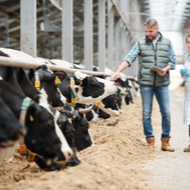
Test provides more accurate, rapid and quantitative results.
Scientists at the Queen's University Belfast and the Institute for Global Food Security (IGFS) have developed a new test for Johne's Disease (JD) that could make it faster and easier to detect the condition in dairy cattle.
The new test, described in the journal Applied Microbiology and Biotechnology, is reported to be more rapid and sensitive in detecting the infectious agent (MAP) of JD in veterinary specimens and has shown greater detection capability than the current milk-ELISA test.
Crucially, the test detects live infectious agent, not just antibodies against MAP as detected by milk-ELISA. It can also be applied to faeces and blood from livestock, in addition to bovine milk.
Researchers hope the test will generate more accurate data on the prevalence of JD - particularly within Northern Ireland, where the true prevalence of the disease is not accurately known.
Professor Irene Grant from Queens University Belfast said: "I hope our test will offer more accurate, rapid and quantitative results, and therefore help farmers and vets make more informed decisions about the infection status of animals in order to control the disease more effectively within herds.
"I also hope it will generate more accurate data on the prevalence of JD within Northern Ireland and therefore build a better picture of this animal-health problem.”
The team now hopes to further develop and validate their test for MAP infection at farm level.



 The Veterinary Medicines Directorate (VMD) is inviting applications from veterinary students to attend a one-week extramural studies (EMS) placement in July 2026.
The Veterinary Medicines Directorate (VMD) is inviting applications from veterinary students to attend a one-week extramural studies (EMS) placement in July 2026.